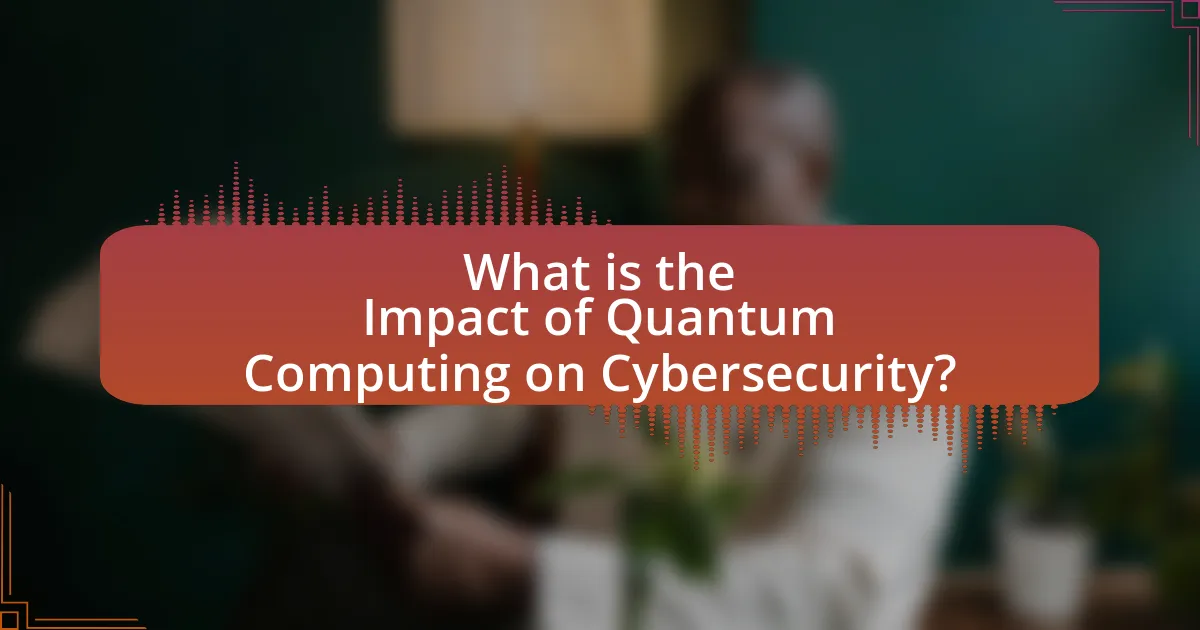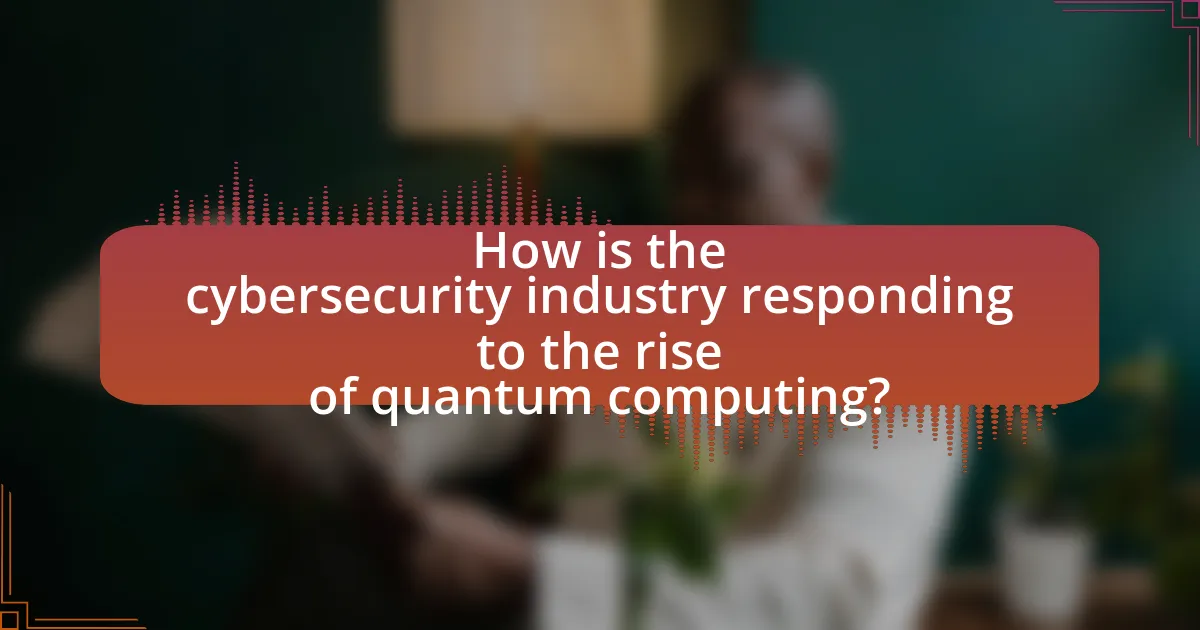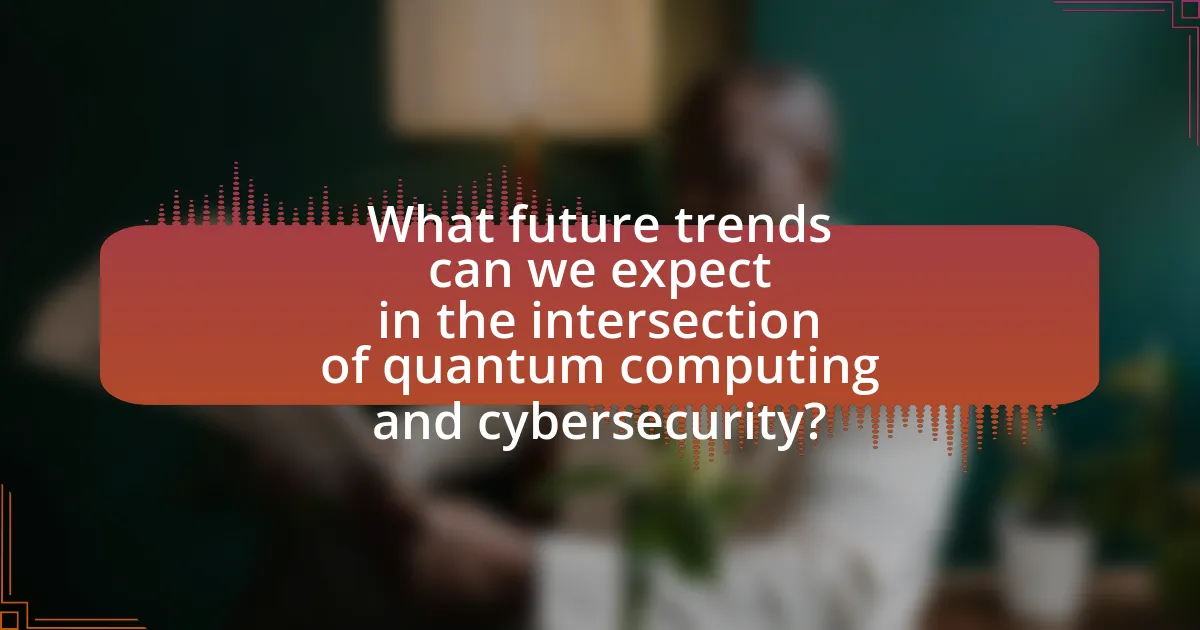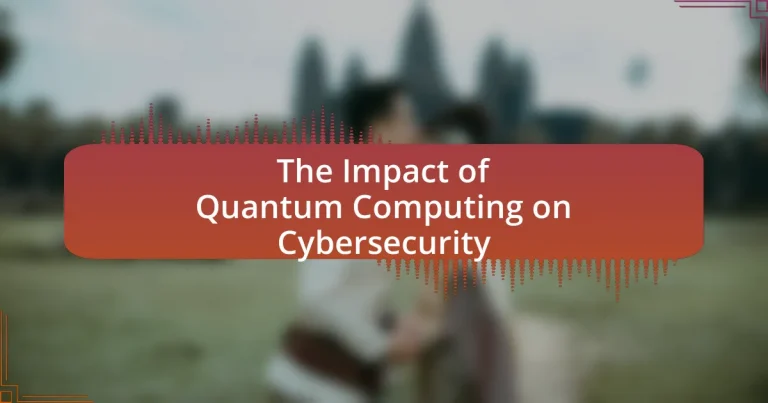The article examines the impact of quantum computing on cybersecurity, highlighting the potential threats it poses to traditional encryption methods such as RSA and ECC. Quantum computers can efficiently solve complex mathematical problems that underpin these encryption algorithms, leading to concerns about data confidentiality and integrity. The discussion includes the fundamental principles of quantum computing, the vulnerabilities of current encryption algorithms, and the urgent need for quantum-resistant cryptographic solutions. Additionally, it explores the ongoing efforts within the cybersecurity industry to develop new standards and strategies to safeguard sensitive information against emerging quantum threats.

What is the Impact of Quantum Computing on Cybersecurity?
Quantum computing poses a significant threat to cybersecurity by potentially breaking widely used encryption methods. Traditional encryption algorithms, such as RSA and ECC, rely on the difficulty of factoring large numbers or solving discrete logarithm problems, which quantum computers can solve efficiently using algorithms like Shor’s algorithm. Research indicates that a sufficiently powerful quantum computer could decrypt sensitive data in seconds, undermining the security of communications, financial transactions, and personal information. This necessitates the development of quantum-resistant cryptographic algorithms to safeguard data against future quantum threats.
How does quantum computing differ from classical computing in terms of cybersecurity?
Quantum computing fundamentally differs from classical computing in cybersecurity by its ability to efficiently solve problems that are currently intractable for classical systems, particularly in breaking encryption. Quantum computers utilize qubits, which can represent multiple states simultaneously, allowing them to perform complex calculations at unprecedented speeds. For example, Shor’s algorithm enables quantum computers to factor large integers exponentially faster than the best-known classical algorithms, posing a significant threat to widely used encryption methods like RSA. This capability raises concerns about the security of sensitive data, as quantum computers could potentially decrypt information that is currently considered secure.
What are the fundamental principles of quantum computing that affect cybersecurity?
The fundamental principles of quantum computing that affect cybersecurity include superposition, entanglement, and quantum measurement. Superposition allows quantum bits (qubits) to exist in multiple states simultaneously, enabling quantum computers to process vast amounts of data more efficiently than classical computers. This capability poses a threat to traditional encryption methods, such as RSA, which rely on the difficulty of factoring large numbers; quantum algorithms like Shor’s algorithm can factor these numbers exponentially faster.
Entanglement creates a correlation between qubits, meaning the state of one qubit can depend on the state of another, regardless of distance. This principle can be utilized in quantum key distribution (QKD), which offers theoretically unbreakable encryption by ensuring that any eavesdropping attempts can be detected. Quantum measurement collapses the superposition of qubits into a definite state, which can impact the security of data transmission if not properly managed.
These principles collectively challenge existing cybersecurity frameworks and necessitate the development of quantum-resistant algorithms to safeguard sensitive information against potential quantum attacks.
How does quantum computing challenge traditional encryption methods?
Quantum computing challenges traditional encryption methods primarily through its ability to efficiently solve problems that are currently intractable for classical computers. For instance, quantum algorithms like Shor’s algorithm can factor large integers exponentially faster than the best-known classical algorithms, undermining the security of widely used encryption schemes such as RSA. This capability means that data encrypted with traditional methods could be decrypted in a feasible timeframe, posing a significant risk to data confidentiality and integrity. The potential of quantum computers to break these encryption methods has been recognized by cybersecurity experts, leading to the development of post-quantum cryptography aimed at creating new encryption standards that can withstand quantum attacks.
What potential threats does quantum computing pose to current cybersecurity practices?
Quantum computing poses significant threats to current cybersecurity practices by potentially breaking widely used cryptographic algorithms. For instance, Shor’s algorithm enables quantum computers to factor large integers efficiently, which undermines the security of RSA encryption, a standard for securing sensitive data. This capability could allow attackers to decrypt confidential communications and access secure systems, leading to data breaches and loss of privacy. Additionally, quantum computers could compromise symmetric key algorithms, such as AES, by reducing the effective key length, making it easier for adversaries to perform brute-force attacks. The implications of these threats necessitate the development of quantum-resistant cryptographic methods to safeguard information in a post-quantum world.
Which encryption algorithms are most vulnerable to quantum attacks?
Encryption algorithms most vulnerable to quantum attacks include RSA, DSA, and ECC. These algorithms rely on mathematical problems that quantum computers can solve efficiently using Shor’s algorithm, which can factor large integers and compute discrete logarithms in polynomial time. For instance, RSA’s security is based on the difficulty of factoring the product of two large prime numbers, a task that becomes feasible for quantum computers, rendering RSA insecure. Similarly, ECC’s security hinges on the difficulty of the elliptic curve discrete logarithm problem, which is also vulnerable to quantum algorithms.
How could quantum computing enable new forms of cyberattacks?
Quantum computing could enable new forms of cyberattacks by significantly reducing the time required to break encryption algorithms that currently secure data. Traditional encryption methods, such as RSA and ECC, rely on the difficulty of factoring large numbers or solving discrete logarithm problems, which quantum computers can solve efficiently using algorithms like Shor’s algorithm. This capability allows attackers to decrypt sensitive information, compromise secure communications, and exploit vulnerabilities in systems that rely on classical cryptography. The potential for quantum computers to perform these calculations exponentially faster than classical computers poses a serious threat to cybersecurity, as evidenced by ongoing research highlighting the urgency for quantum-resistant encryption methods.
What are the implications of quantum computing for data privacy and security?
Quantum computing poses significant implications for data privacy and security by potentially breaking current encryption methods. Traditional encryption algorithms, such as RSA and ECC, rely on the difficulty of factoring large numbers or solving discrete logarithm problems, which quantum computers can solve efficiently using algorithms like Shor’s algorithm. This capability threatens the confidentiality of sensitive data, as quantum computers could decrypt information that is currently considered secure. For instance, a quantum computer with sufficient qubits could compromise encrypted communications and stored data, leading to unauthorized access and data breaches. The urgency for developing quantum-resistant cryptographic algorithms is underscored by the National Institute of Standards and Technology (NIST), which is actively working on standardizing post-quantum cryptography to safeguard data against these emerging threats.
How might quantum computing affect personal data protection laws?
Quantum computing could significantly undermine personal data protection laws by enabling the decryption of data that is currently considered secure. Traditional encryption methods, such as RSA and ECC, rely on the difficulty of factoring large numbers or solving discrete logarithm problems, which quantum computers can potentially solve efficiently using algorithms like Shor’s algorithm. This capability raises concerns about the adequacy of existing data protection frameworks, as sensitive personal information could be exposed, necessitating a reevaluation and strengthening of legal protections to address vulnerabilities introduced by quantum technologies.
What measures can organizations take to safeguard data against quantum threats?
Organizations can safeguard data against quantum threats by implementing quantum-resistant cryptographic algorithms. These algorithms, such as lattice-based, hash-based, and multivariate polynomial cryptography, are designed to withstand the decryption capabilities of quantum computers. For instance, the National Institute of Standards and Technology (NIST) is actively working on standardizing post-quantum cryptography, which aims to provide secure encryption methods that remain effective even in the presence of quantum computing advancements. By transitioning to these quantum-resistant algorithms, organizations can significantly reduce the risk of data breaches and unauthorized access that could arise from quantum computing capabilities.

How is the cybersecurity industry responding to the rise of quantum computing?
The cybersecurity industry is actively developing quantum-resistant cryptographic algorithms to counter the threats posed by quantum computing. Organizations such as the National Institute of Standards and Technology (NIST) are leading initiatives to standardize post-quantum cryptography, with NIST announcing the first round of selected algorithms in July 2022. Additionally, cybersecurity firms are investing in research and development to create solutions that can withstand quantum attacks, as evidenced by the increasing number of partnerships between tech companies and academic institutions focused on quantum security. This proactive approach aims to ensure data protection and maintain the integrity of digital communications in a future where quantum computing capabilities could potentially break current encryption methods.
What strategies are being developed to counteract quantum threats?
Strategies being developed to counteract quantum threats include the implementation of post-quantum cryptography, which aims to create cryptographic algorithms that are secure against quantum computing attacks. Research institutions and organizations, such as the National Institute of Standards and Technology (NIST), are actively working on standardizing these algorithms to ensure they can withstand the capabilities of quantum computers. For example, NIST’s Post-Quantum Cryptography Standardization project has identified several candidate algorithms that are resistant to quantum attacks, such as lattice-based, hash-based, and code-based cryptography. These efforts are crucial as quantum computers have the potential to break widely used encryption methods, thereby threatening data security and privacy.
What role does quantum-resistant encryption play in future cybersecurity?
Quantum-resistant encryption is essential for future cybersecurity as it protects sensitive data against the potential threats posed by quantum computers. Quantum computers can efficiently break traditional encryption methods, such as RSA and ECC, which rely on the difficulty of factoring large numbers or solving discrete logarithms. Research indicates that quantum computers could render these encryption methods obsolete, necessitating the development of new algorithms that can withstand quantum attacks. The National Institute of Standards and Technology (NIST) is actively working on standardizing quantum-resistant algorithms, highlighting the urgency and importance of this transition in securing digital communications and data integrity in a post-quantum world.
How are organizations adapting their cybersecurity frameworks in anticipation of quantum computing?
Organizations are adapting their cybersecurity frameworks by integrating post-quantum cryptography to safeguard against the potential threats posed by quantum computing. This adaptation involves transitioning from traditional cryptographic algorithms, which could be easily broken by quantum algorithms like Shor’s algorithm, to quantum-resistant algorithms that are designed to withstand quantum attacks. For instance, the National Institute of Standards and Technology (NIST) has been actively working on standardizing post-quantum cryptographic algorithms, with several candidates selected for further evaluation, indicating a proactive approach by organizations to align with these emerging standards. Additionally, organizations are conducting risk assessments to identify vulnerabilities in their current systems and are investing in training for their cybersecurity teams to ensure they are equipped to handle the complexities introduced by quantum technologies.
What collaborations are occurring between quantum computing and cybersecurity experts?
Collaborations between quantum computing and cybersecurity experts are increasingly focused on developing quantum-resistant encryption methods to safeguard data against potential threats posed by quantum computers. For instance, organizations like the National Institute of Standards and Technology (NIST) are actively working with researchers to standardize post-quantum cryptographic algorithms, which are designed to be secure against quantum attacks. Additionally, tech companies such as IBM and Google are partnering with academic institutions to explore quantum key distribution (QKD) techniques, which leverage quantum mechanics to enhance secure communication. These collaborations aim to address the vulnerabilities in current encryption systems and ensure robust cybersecurity in the quantum computing era.
How are academic institutions contributing to quantum cybersecurity research?
Academic institutions are significantly contributing to quantum cybersecurity research by developing innovative algorithms and protocols that enhance data security against quantum threats. For instance, universities like MIT and Stanford are conducting research on post-quantum cryptography, which aims to create encryption methods resilient to quantum computing attacks. Additionally, collaborative projects such as the Quantum Internet Initiative, involving multiple academic institutions, focus on building a secure quantum communication network. These efforts are supported by funding from government agencies like the National Science Foundation, which allocated $75 million to quantum research initiatives in 2020, underscoring the critical role of academia in advancing quantum cybersecurity.
What partnerships are forming between tech companies and cybersecurity firms?
Tech companies are increasingly forming partnerships with cybersecurity firms to enhance security measures against emerging threats, particularly those posed by quantum computing. For instance, IBM has collaborated with various cybersecurity firms to develop quantum-safe encryption methods, addressing vulnerabilities that quantum computers could exploit. Additionally, Google has partnered with cybersecurity companies to integrate advanced security protocols into its cloud services, ensuring data protection in a quantum computing landscape. These partnerships are crucial as they leverage the expertise of cybersecurity firms to create robust defenses against the anticipated risks associated with quantum advancements.

What future trends can we expect in the intersection of quantum computing and cybersecurity?
Future trends in the intersection of quantum computing and cybersecurity include the development of quantum-resistant encryption algorithms and the increased use of quantum key distribution (QKD) for secure communication. As quantum computers advance, they will possess the capability to break traditional encryption methods, prompting the cybersecurity industry to prioritize the creation of new cryptographic standards that can withstand quantum attacks. For instance, the National Institute of Standards and Technology (NIST) is actively working on post-quantum cryptography standards, with the aim of finalizing these by 2024. Additionally, QKD, which leverages the principles of quantum mechanics to ensure secure key exchange, is gaining traction in sectors requiring high security, such as finance and government. This trend indicates a shift towards integrating quantum technologies into existing cybersecurity frameworks to enhance data protection against emerging threats.
How will advancements in quantum computing shape the future of cybersecurity?
Advancements in quantum computing will significantly disrupt cybersecurity by rendering traditional encryption methods vulnerable. Quantum computers possess the capability to solve complex mathematical problems, such as factoring large integers, at speeds unattainable by classical computers. This ability threatens widely used encryption algorithms like RSA and ECC, which rely on the difficulty of these problems for security. For instance, a sufficiently powerful quantum computer could break RSA encryption in a matter of hours, a task that would take classical computers thousands of years. Consequently, the cybersecurity landscape will need to evolve towards quantum-resistant algorithms, such as lattice-based cryptography, to safeguard sensitive information against potential quantum attacks.
What emerging technologies are likely to influence quantum cybersecurity?
Emerging technologies likely to influence quantum cybersecurity include quantum key distribution (QKD), post-quantum cryptography, and artificial intelligence (AI). Quantum key distribution enables secure communication by using quantum mechanics to create encryption keys that are theoretically immune to eavesdropping. Post-quantum cryptography focuses on developing cryptographic algorithms that can withstand attacks from quantum computers, ensuring data security in a quantum future. Additionally, AI can enhance cybersecurity measures by improving threat detection and response capabilities, making systems more resilient against potential quantum attacks. These technologies collectively address the vulnerabilities introduced by quantum computing, as evidenced by ongoing research and development in the field.
How can organizations prepare for the future landscape of cybersecurity in a quantum world?
Organizations can prepare for the future landscape of cybersecurity in a quantum world by adopting quantum-resistant cryptographic algorithms. These algorithms are designed to withstand the potential threats posed by quantum computers, which can break traditional encryption methods. For instance, the National Institute of Standards and Technology (NIST) is currently in the process of standardizing post-quantum cryptography, which provides a framework for organizations to transition to more secure encryption methods. By implementing these quantum-resistant solutions, organizations can mitigate risks associated with quantum computing advancements and ensure the integrity and confidentiality of their data.
What best practices should organizations adopt to enhance their cybersecurity in light of quantum computing?
Organizations should adopt post-quantum cryptography as a best practice to enhance their cybersecurity in light of quantum computing. This involves transitioning to cryptographic algorithms that are resistant to quantum attacks, such as lattice-based, hash-based, and code-based cryptography. The National Institute of Standards and Technology (NIST) is currently in the process of standardizing post-quantum cryptographic algorithms, which provides a reliable framework for organizations to follow. Implementing these algorithms will help secure sensitive data against potential threats posed by quantum computers, which can break traditional encryption methods like RSA and ECC in polynomial time.
How can businesses implement quantum-resistant solutions effectively?
Businesses can implement quantum-resistant solutions effectively by adopting post-quantum cryptographic algorithms that are designed to withstand quantum computing threats. These algorithms, such as lattice-based, hash-based, and code-based cryptography, have been identified by the National Institute of Standards and Technology (NIST) as viable options for securing data against potential quantum attacks.
To ensure a smooth transition, businesses should conduct a thorough assessment of their current cryptographic infrastructure, identifying areas that require upgrades to quantum-resistant standards. Additionally, organizations should engage in pilot programs to test the integration of these new algorithms within their existing systems, ensuring compatibility and performance.
Furthermore, continuous education and training for IT staff on quantum threats and the implementation of quantum-resistant technologies are essential. By staying informed about advancements in quantum cryptography and participating in industry collaborations, businesses can enhance their preparedness against future quantum computing risks.
What ongoing training and awareness programs are essential for cybersecurity teams?
Ongoing training and awareness programs essential for cybersecurity teams include regular workshops on emerging threats, hands-on simulations of cyber attacks, and continuous education on the latest cybersecurity technologies and practices. These programs ensure that cybersecurity professionals remain updated on the evolving landscape of threats, including those posed by quantum computing, which can potentially break traditional encryption methods. Research indicates that organizations with robust training programs experience a 70% reduction in security incidents, highlighting the effectiveness of ongoing education in maintaining a strong security posture.




